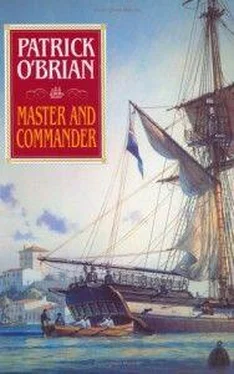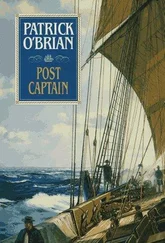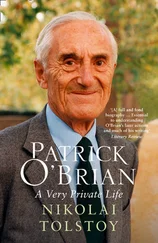'Mr Ricketts,' he said, 'what may I do for you?'
'Sir,' said the midshipman, 'the captain says, will you please to come on deck and view the coast?'
'To the left of the smoke, southwards, that is the hill of Montjuich, with the great castle; and the projection to the right is Barceloneta,' said Stephen. 'And rising there behind the city you can make out Tibidabo: I saw my first red-footed falcon there, when I was a boy. Then continuing the line from Tibidabo through the cathedral to the sea, there is the Moll de Santa Creu, with the great mercantile port: and to the left of it the basin where the King's ships and the gunboats lie.'
'Many gunboats?' asked Jack.
'I dare say: but I never made it my study.'
Jack nodded, looked keenly round the bay to fix its details in his mind once more and, leaning down, he called, 'Deck? Lower away: handsomely now. Babbington, look alive with that line.'
Stephen rose six inches from his perch at the masthead, and with his hands folded to prevent their involuntary clutching at passing ropes, yards, blocks, and with the ape-nimble Babbington keeping pace, heaving him in towards the weather backstay, he descended through the dizzy void to the deck, where they let him out of the cocoon in which they had hoisted him aloft; for no one on board had the least opinion of his abilities as a seaman.
He thanked them absently and went below, where the sailmaker's mates were sewing Tom Simmons into his hammock.
'We are just waiting for the shot, sir,' they said; and as they spoke Mr Day appeared, carrying a net of the Sophie's cannonballs.
'I thought I would pay him the attention myself,' said the gunner, arranging them at the young man's feet with a practised hand. 'He was shipmates with me in the Phoebe: though always unhealthy, even then,' he added, as a quick afterthought.
'Oh, yes: Tom was never strong,' said one of the sail-maker's mates, cutting the thread on his broken eye-tooth.
These words, and a certain unusual delicacy of regard, were intended to comfort Stephen, who had lost his patient: in spite of all his efforts the four-day coma had deepened to its ultimate point.
'Tell me, Mr Day,' he said, when the sailmakers had gone, 'just how much did he drink? I have asked his friends, but they give evasive answers – indeed, they lie.'
'Of course they do, sir: for it is against the law. How much did he drink? Why, now, Tom was a popular young chap, so I dare say he had the whole allowance, bating maybe a sip or two just to moisten their victuals. That would make it close on a quart.'
'A quart. Well, it is a great deal: but I am surprised it should kill a man. At an admixture of three to one, that amounts to six ounces or so – inebriating, but scarcely lethal.'
'Lord, Doctor,' said the gunner, looking at him with affectionate pity, 'that ain't the mixture. That's the rum.'
'A quart of rum? Of neat rum?' cried Stephen.
'That's right, sir. Each man has his half-pint a day, at twice, so that makes a quart for each mess for dinner and for supper: and that is what the water is added to. Oh dear me,' he said, laughing gently and patting the poor corpse on the deck between them, 'if they was only to get half a pint of three-water grog we should soon have a bloody mutiny on our hands. And quite right, too.'
'Half a pint of spirits a day for every man?' said Stephen, flushing with anger. 'A great tumbler? I shall tell the captain – shall insist upon its being poured over the side.'
'And so we commit his body to the deep,' said Jack, closing the book. Tom Simmons' messmates tilted the grating: there was the sound of sliding canvas, a gentle splash and a long train of bubbles rising up through the clear water.
'Now, Mr Dillon,' he said, with something of the formal tone of his reading still in his voice, 'I think we may carry on with the weapons and the painting.'
The sloop was lying to, well over the horizon from Barcelona; and a little while after Tom Simmons had reached the bottom in four hundred fathoms she was far on her way to becoming a white-painted snow with black top-sides, with a horse – a length of cable bowsed rigidly vertical – to stand for the trysail mast of that vessel; while at the same time the grindstone mounted on the fo'c'sle turned steadily, putting a keener edge, a sharper point, on cutlasses, pikes, boarding-axes, marines' bayonets, midshipmen's dirks, officers' swords.
The Sophie was as busy as she could well be, but there was a curious gravity with it all: it was natural that a man's messmates should be low after burying him, and even his whole watch. (for Tom Simmonds had been well liked – would never have had so deadly a birthday present otherwise); but this solemnity affected the whole ship's company and there was none of those odd bursts of song on the fo'c'sle, none of those ritual jokes called out. There was a quiet, brooding atmosphere, not at all angry or sullen, but – Stephen, lying in his cot (he had been up all night with poor Simmons) tried to hit upon the definition – oppressive? – fearful? – vaticinatory? But in spite of all the deeply shocking noise of Mr Day and his party overhauling the shot-lockers, scaling all the balls with any rust or irregularity upon them, and trundling them back down an echoing plane, hundreds and hundreds of four-pound cannon-balls clashing and growling and being beaten, he went to sleep before he could accomplish it.
He woke to the sound of his own name. 'Dr Maturin? No, certainly you may not see Dr Maturin,' said the master's voice in the gun-room. 'You may leave a message with me, and I will tell him at dinner-time, if he wakes up by then.'
'I was to ask him what physic would answer for a slack-going horse,' quavered Ellis, now filled with doubt.
'And who told you to ask him that? That villain Babbington, I swear. For shame, to be such a flat, after all these weeks at sea.'
This particular atmosphere had not reached the midshipmen's berth, then; or if so it had already dissipated. What private lives the young led, he reflected, how very much apart: their happiness how widely independent of circumstance. He was thinking of his own childhood – the then intensity of the present – happiness not then a matter of retrospection nor of undue moment – when the howling of the bosun's pipe for dinner caused his stomach to give a sharp sudden grinding wring and he swung his legs over the side. 'I am grown a naval animal,' he observed.
These were the fat days of the beginning of a cruise; there was still soft tack on the table, and Dillon, standing bowed under the beams to carve a noble saddle of mutton, said, 'You will find the most prodigious transformation when you go on deck. We are no longer a brig, but a snow.'
'With an extra mast,' explained the master, holding up three fingers.
'Indeed?' said Stephen, eagerly passing up his plate. 'Pray, why is this? For speed, for expediency, for comeliness?'
'To amuse the enemy.'
The meal continued with considerations on the art of war, the relative merits of Mahon cheese and Cheshire, and the surprising depth of the Mediterranean only a short way off the land; and once again Stephen noticed the curious skill (the outcome, no doubt, of many years at sea and the tradition of generations of tight-packed mariners) with which even so gross a man as the purser helped to keep the conversation going, smoothing over the dislikes and tensions – with platitudes, quite often, but with flow enough to make the dinner not only easy, but even mildly enjoyable.
'Take care, Doctor,' said the master, steadying him from behind on the companion ladder. 'She's beginning to roll.'
She was indeed, and although the Sophie's deck was only so trifling a height from what might be called her subaqueous gun-room, the motion up there was remarkably greater: Stephen staggered, took hold of a stanchion and gazed about him expectantly.
Читать дальше
Конец ознакомительного отрывка
Купить книгу












